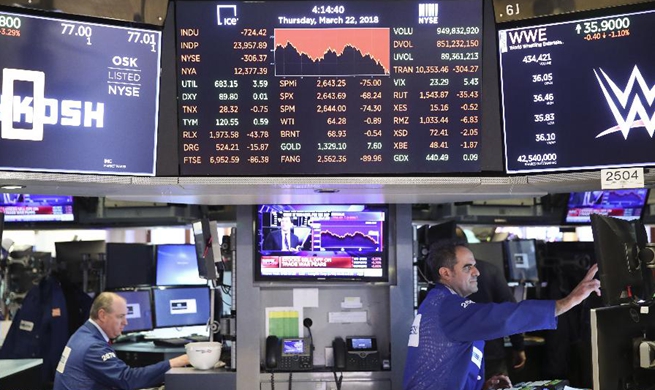by Xinhua writers Li Ming, Wang Naishui
NEW YORK, March 23 (Xinhua) -- U.S. President Donald Trump's latest tariff plan on imports from China can not solve America's trade deficit problem and will only harm the two sides, a U.S. expert has said.
"The actions taken today by the Trump administration pose great danger to China, the United States, and the world economy," Stephen Roach, former chairman of Morgan Stanley Asia and senior fellow at Yale University's Jackson Institute for Global Affairs, told Xinhua on Thursday.
Earlier in the day, Trump signed a memorandum that could impose tariffs on up to 60 billion U.S. dollars of imports from China, the latest unilateral move that poses a threat to global trade.
WRONG SOLUTION
The administration's move was consistent with its long-standing notion of blaming trade deficits for the loss of the country's manufacturing jobs, which in Roach's eyes "reflects a fundamental misunderstanding between cause and effect."
"U.S. trade deficits are not the problem. They are, in effect, a symptom of a much bigger problem: A profound shortfall of domestic saving," he said.
According to the U.S. Bureau of Economic Analysis, over the first three quarters of 2017, America's net national savings rate -- the combined depreciation-adjusted savings of households, businesses, and the government sector -- averaged 1.9 percent of national income.
The reading was less than one-third of the average of 6.3 percent in the final three decades of the 20th century and in fact the lowest savings rate for any leading nation in modern history, Roach noted.
The economist explained that "lacking in savings and wanting to consume and grow, the United States must import surplus savings from abroad and then run massive current account and trade deficits to attract the foreign capital."
"The trade problem cannot be addressed by tariffs. It is a savings problem that can only be addressed by boosting domestic savings," Roach said, adding that the real solutions should be cutting Federal budget deficits and providing increased savings incentives for American consumers.
"The failure to appreciate the link between savings and trade could well go down in history as a major policy blunder for the United States," he said.
QUESTIONABLE NUMBERS
Data from the U.S. Commerce Department showed that the U.S. goods deficits with China last year registered 375.2 billion dollars, or nearly half of the total trade gap between the U.S. imports and exports, a number Roach thought should be given a second look.
"A significant portion of this imbalance reflects measurement problems due to supply chain distortions of final shipments-based trade flows," he said.
To further illustrate the problem, the professor took iPhone's global supply chain as an example.
China assembles final products like iPhones that have components and parts from many other countries; yet when the final product is shipped to the United States, fully 100 percent of its value is counted as a Chinese import -- well in excess of the actual value-added in China, which for some Apple products has been estimated at around 10 percent, Roach said.
According to his research, the supply-chain adjusted bilateral deficit between the United States and China was about 28 percent of the total merchandise imbalance, which he admitted to be a large number, but "a more realistic assessment of the China impact on America's 'trade problem.'"
In Roach's view, "this still large share" is a reflection of the dispersion of comparative advantage in the broad mix of America's trading partners as well as the price and cost advantages that accrue to U.S. consumers through international specialization.
"For a savings-short U.S. economy, these are the costs that Americans must learn to accept," he said.
REASONABLE RESPONSE
The Chinese Embassy in the United States, in response to the tariff announcement, said "It is a typical unilateral trade protectionist action. China is strongly disappointed and firmly opposes such an action."
"The actions undertaken by the United States are self-defeating. They will directly harm the interests of U.S. consumers, companies, and financial markets. They also jeopardize international trade order and world economic stability," the Chinese embassy said in a statement on Thursday.
Roach said that China is well within its rights as a sovereign nation to underscore the consequences that the United States could face, namely a disruption to trade and capital flows between the two countries.
He also suggested China frame its response within the structure of the global rules-based system given the significance of the U.S.-China economic relations as well as the huge impact on the world economy.
China is America's third largest and most rapidly growing export market, and the United States will suffer as "such an increasingly important source of U.S. external demand becomes a source of vulnerability if those shipments are disrupted," Roach said.
Similarly, as the largest foreign holder of U.S. Treasury debt, China has an important role to play in funding the increased budget deficits of the Trump administration -- a role that could be seriously questioned as the United States launches a trade war against China, he said.

















